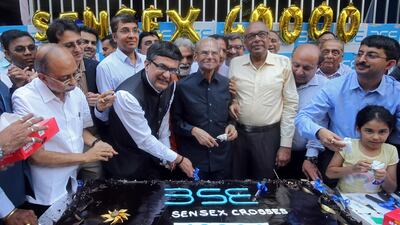India’s equity benchmark broke its best stretch of weekly gains since April, as investors assessed the outlook after the central bank yesterday cut its economic forecast and unexpectedly kept interest rates unchanged.
The S&P BSE Sensex Index declined 0.8 per cent to 40,445.15 at the 3:30 pm close in Mumbai. The gauge fell 0.9 per cent for the week, ending a five-week winning streak. The NSE Nifty 50 Index also fell 0.8 per cent today.
Foreign investors have pumped $13.2 billion in India stocks so this year, exceeding the highest annual inflow since 2014, according to data compiled by Bloomberg. The Sensex is retreating from a record high close on November 28.
“RBI’s decision to pause on rate cuts is accentuating investors’ concern about economic growth, and therefore we are seeing some selling pressure,” said Chokkalingam G managing director and founder at Equinomics Research & Advisory in Mumbai. “Selling may continue for some time in highly valued large stocks, he added.
“Lower lending rates are unlikely to lift growth unless demand and sentiment also improve, perhaps from fiscal measures in the Feb Budget as the RBI appears to suggest,” Jefferies Financial Group strategists including Somshankar Sinha wrote in a note on Thursday. “India’s extended valuations may already be pricing some of this in, though, leaving us defensive,” the note added.
“The recent decline shows disappointment among the participants post the RBI policy outcome as the majority were hoping for a rate cut,” said Ajit Mishra, vice president of research at Religare Broking. “Since the Nifty has breached its immediate support at 11,900, we may see further profit taking ahead.”
The Numbers
- Eighteen of 19 sector sub-indexes compiled by BSE rose, led by a gauge of auto stocks.
- Interest rate-sensitive stocks including State Bank of India and Tata Motors were among the top losers on the benchmark.

